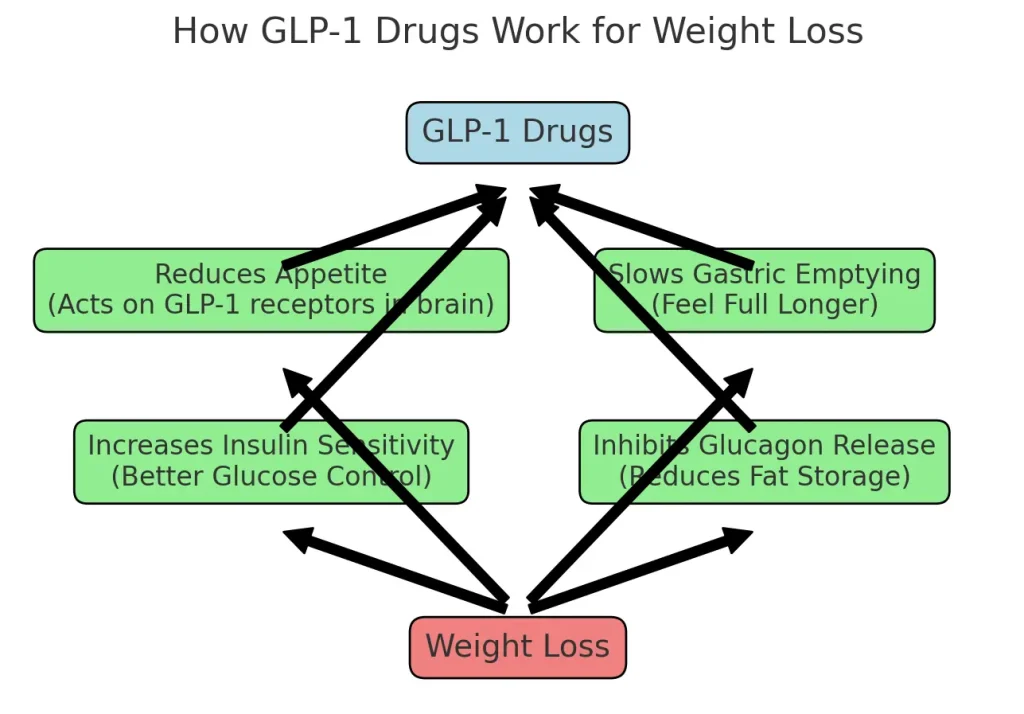Understanding GLP Drugs: What They Are and Why People Take Them

We have probably all seen the recent press on GLP drugs, or glucagon-like peptide-1 receptor agonists. You might know them by brand names like Ozempic®, Wegovy®, Mounjaro® or Zepbound®. These drugs have attracted significant attention in both medical communities and the general public. They were initially developed to manage type 2 diabetes, but are now being explored for a broader range of uses, most popularly, in weight management but also importantly, in cardiovascular health. In this short review I will explain what exactly GLP drugs are, and why someone might want to take them.
What Are GLP Drugs?
GLP drugs belong to a class of medications known as GLP-1 receptor agonists. They mimic the action of a naturally occurring hormone called glucagon-like peptide-1 (GLP-1), which plays a crucial role in regulating blood sugar levels and appetite. When food enters the small intestine, GLP-1 is released, stimulating the pancreas to secrete insulin, the hormone responsible for lowering blood sugar. GLP-1 also signals the brain to induce satiety (the feeling of being full) and slows down the rate at which the stomach empties, thus reducing hunger and controlling food intake.
The most common GLP-1 receptor agonists on the market include medications like semaglutide (Ozempic, Wegovy) and tirzepatide (Mounjaro, Zepbound). Other names you might have heard include exenatide (Byetta,® Bydureon®), liraglutide (Victoza®, Saxenda®), and dulaglutide (Trulicity®). Although you are less likely to have heard of it, a forthcoming medication in current clinical trials is called retatrutide and emerging data suggest it might be the most effective drug so far when it is released. Retatrutide is a next level drug because it is a “triple agonist,” adding metabolic benefits to those provided by other drugs. For now, let’s stick to the ones approved by the FDA and on the market.
These drugs are typically administered via weekly injection, though some formulations, like semaglutide, are now available in oral form and drug companies are actively working on oral forms for tirzepatide. For now though, weekly injection is the standard.

How do they work?
GLP drugs work by stimulating the GLP-1 receptor, enhancing the effects of the hormone GLP-1. Their primary actions include:
Appetite Reduction:
GLP drugs act on the brain’s hypothalamus, specifically at the GLP-1 receptors, to reduce hunger signals. This reduces appetite, leading to lower calorie intake.
Slowing Gastric Emptying:
GLP drugs slow down the rate at which food leaves the stomach, helping people feel full longer after meals, further reducing hunger and calorie consumption.
Increased Insulin Sensitivity:
GLP drugs help increase insulin secretion when blood sugar levels are high, which can improve insulin sensitivity and reduce fat storage.
Inhibition of Glucagon Release:
By lowering glucagon (a hormone that raises blood sugar), GLP drugs help control glucose levels, which also play a role in reducing appetite.
Why Would Someone Want to Take GLP Drugs?
There are several reasons why someone might choose to take GLP drugs, ranging from goals such as weight loss and improved heart health, to medical conditions like type 2 diabetes.
Weight Loss
For individuals struggling with obesity, GLP drugs can help by reducing hunger, making it easier to adhere to a calorie-controlled diet. They also slow gastric emptying, meaning that people feel fuller for longer after eating. Studies have shown that people taking GLP-1 receptor agonists for weight loss can experience a significant reduction in body weight, with some losing a significant percentage of their initial body weight over time.
The fact that GLP drugs target appetite regulation at the hormonal level makes them a promising tool for sustainable weight loss, particularly for those who have struggled with traditional diet and exercise approaches. One of the advantages patients refer to very frequently is a quieting or cessation of “food noise” meaning that they are able to have a healthier relationship with food when they are not bombarded with thoughts about the next snack or meal.
Cardiovascular Benefits
Recent research has uncovered that GLP drugs may also offer protective benefits for the heart. Several large clinical trials have demonstrated that GLP-1 receptor agonists can reduce the risk of cardiovascular events, such as heart attacks and strokes, in people with type 2 diabetes who are at high risk for heart disease. This is significant, as cardiovascular disease is one of the leading causes of death in people with diabetes.
For example, medications like liraglutide and semaglutide have been shown to lower the risk of major cardiovascular events in people with diabetes, independent of their effects on blood sugar.1 As a result, GLP drugs are increasingly being recommended not only for managing blood sugar but also for protecting heart health.
Conclusion
GLP drugs represent a major advancement in the management of obesity and cardiovascular health in addition to the management of type 2 diabetes, for which they were originally developed. GLP drugs offer a comprehensive approach to improving metabolic health. Given their effectiveness and expanding range of benefits, it is no wonder that GLP-1 receptor agonists are becoming an increasingly popular choice for both doctors and patients alike.
1 Marso SP, Daniels GH, Brown-Frandsen K, Kristensen P, Mann JF, Nauck MA, Nissen SE, Pocock S, Poulter NR, Ravn LS, Steinberg WM, Stockner M, Zinman B, Bergenstal RM, Buse JB; LEADER Steering Committee; LEADER Trial Investigators. Liraglutide and Cardiovascular Outcomes in Type 2 Diabetes. N Engl J Med. 2016 Jul 28;375(4):311-22. doi: 10.1056/NEJMoa1603827. Epub 2016 Jun 13. PMID: 27295427; PMCID: PMC4985288. Available: https://pubmed.ncbi.nlm.nih.gov/27295427/. Accessed October 22, 2024.
